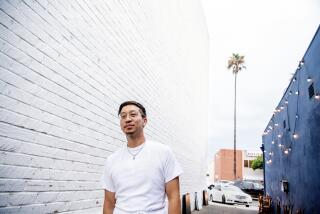Convicted Killer Siripongs Put to Death
- Share via
SAN QUENTIN, Calif. — Jaturun “Jay” Siripongs, the former Buddhist monk who killed a Garden Grove market owner and a clerk in 1981, died by lethal injection early today, marking California’s sixth execution since it reinstated the death penalty 20 years ago.
The execution came just after midnight as Siripongs lay strapped to a padded table inside the converted gas chamber at San Quentin prison. It had has been opposed by some on the basis of the 42-year-old’s difficult childhood as well as his quiet manner and sensitive artwork done behind bars.
Siripongs came within hours of being put to death in November before a federal judge issued a temporary order blocking the execution. But his hopes for another reprieve faded after denials Monday from both the U.S. Supreme Court and a federal appeals court.
“We want this chapter finished once and for all,” said Vitoon Harusadangkul, 31, the son of one of the victims, as he entered San Quentin prison to witness the execution. “It’s been 18 years that we’ve wanted this over.”
Efforts to spare Siripongs’ life were supported by several unlikely sources, including a former San Quentin prison warden and two former jurors who had recommended the death penalty. The husband of one of the victims, a Buddhist who opposes capital punishment, asked that the death sentence be commuted to life in prison without parole.
None of them contested Siripongs’ guilt but said his sentence should be reduced to life in prison because of his exemplary prison record and the effects of his troubled upbringing.
Late Monday, Pope John Paul II joined the pleas for clemency. In a letter to Gov. Gray Davis on the pope’s behalf, the Vatican’s ambassador to the United States urged “a gesture of mercy that would certainly contribute to the promotion of nonviolence in today’s society.” Last month, the pope’s personal pleas while visiting St. Louis prompted the governor of Missouri to spare a prisoner on death row.
But Davis, in rejecting clemency over the weekend, said he had to consider Siripongs’ victims.
“Model behavior cannot bring back the lives of the two innocent murder victims,” he said. “These capital crimes can only be satisfied by the duly imposed sentence.”
In response to the pope’s last-minute plea, Davis spokesman Michael Bustamante said: “The governor made his decision on Saturday.”
As they have in preparation for previous executions at San Quentin, authorities tightened security at the prison and the surrounding area Monday.
Roads into San Quentin Village, a bay-side hamlet next to the prison, were blocked. Sheriff’s deputies, correctional officers and California Highway Patrol officers were stationed in and around the prison grounds.
As a cold rain fell Monday evening, about 200 protesters gathered outside the prison, hoping that the execution would be blocked.
“The state cannot kill without people being here to show that killing is wrong,” said Michael Bauman, 32, who came with other members of San Francisco-area groups opposed to the death penalty. “We’re not going to let them do this in the darkest of night while everyone is tucked in their homes.”
A group of Buddhists silently meditated on a blue plastic tarp, facing a line of prison guards dressed riot gear.
Inside the prison, Siripongs met during the afternoon with his sister, attorneys and a Buddhist monk who offered him spiritual support, corrections officials said. For his last meal, he was served two 40-cent cups of Mission Pride canned peaches and two 45-cent cans of Lucky Arctic iced tea.
Siripongs was raised in a brothel in Thailand after his parents separated. He was convicted in that country for participating in a burglary of a department store and served time in a Thai prison. Later, he was initiated as a Buddhist monk.
Inmates and wardens described him as a gentle man who prayed every day and painted scenes of his native Thailand in his cell.
But prosecutors have called the evidence against Siripongs overwhelming.
“What was incredibly callous about Siripongs’ actions was his strangling a woman who had kindly employed him in the past . . . stealing [her] jewelry and pawning it within hours of the crime . . . before the victims were even buried,” wrote Deputy Atty. Gen. Laura Halgren in court documents filed earlier this month.
A federal judge temporarily blocked Siripongs’ first scheduled execution to examine defense arguments that then-Gov. Pete Wilson did not fairly evaluate evidence before denying the killer clemency.
But the judge later ruled that Siripongs’ rights had not been violated, clearing the way for an Orange County Superior Court judge to reschedule the execution for a minute after midnight Monday.
Siripongs’ most recent claim, filed last month, charged prosecutors with concealing evidence about a possible accomplice. It also alleged that Siripongs was denied his rights under terms of an international treaty that allows incarcerated foreigners to seek assistance from their consulates.
The claims were rejected by the California Supreme Court last week.
Siripongs’ 17-year legal journey began with his conviction for the strangling of store owner Packovan “Pat” Wattanaporn and the stabbing of clerk Quach Nguyen during a robbery at the Pantai market in Garden Grove, where Siripongs had worked.
Attorneys pressed the case for years in a series of appeals, arguing that Siripongs did not receive an adequate defense during the original trial in 1983. They said that he admitted participating in the robbery but claimed that an accomplice killed the victims.
Siripongs has refused to name the alleged accomplice, and every court that considered the case affirmed the guilty verdict and death penalty.
The families of the victims, Buddhists as is Siripongs, have been ambivalent about the imposition of the death penalty from the beginning. Reflecting his religion’s emphasis on mercy over revenge, Surachai Wattanaporn, husband of the slain store owner, joined the Thai government in a plea to Wilson for clemency.
But Harusadangkul, the son of the store manager, said Siripongs deserves to die.
“My personality changed that day to incorporate hatred, anger and vengeance,” Harusadangkul testified before a state prison board last week. Harusadangkul was 14 when his mother was killed at the store she managed.
“What he did, he should pay for. It’s about time,” he said. “I miss my mother. Not a day goes by when I don’t think of her.”
Siripongs was 26 and had lived in the United States for about a year when he robbed the market on the afternoon of Dec. 15, 1981.
The Wattanaporns ran an import-export jewelry business from the market. They had given Siripongs a part-time job cleaning floors.
Prosecutors say Siripongs strangled Packovan Wattanaporn using a nylon cord. He stabbed Nguyen, a Vietnamese immigrant and father of four, several times in the head and neck. Cuts on Siripongs’ hands suggested to police that Nguyen struggled fiercely.
Surachai Wattanaporn found the bodies lying face-down in a puddle of blood in the store’s storage room.
Police arrested Siripongs two days later when he tried to buy a television set with Wattanaporn’s credit card. At the trial, prosecutors submitted more than 100 items of evidence, much of it found in a trash bin near the Cerritos home of a friend of Siripongs. The items included Packovan Wattanaporn’s wallet and purse, a pair of bloodstained shoes in Siripongs’ size and a bloody kitchen knife.
At Siripongs’ home in Hawthorne, police found Packovan Wattanaporn’s jewelry and several credit card receipts forged with the grocery store owner’s name. Jewelry worth more than $20,000 that belonged to Wattanaporn eventually was traced to Siripongs.
More to Read
Sign up for Essential California
The most important California stories and recommendations in your inbox every morning.
You may occasionally receive promotional content from the Los Angeles Times.














